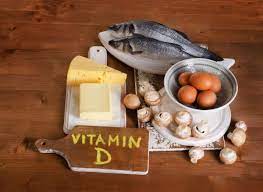5 Signs you are low in Vitamin D
5 Signs you are low in Vitamin D

5 Signs you're Low in Vitamin D
Vitamin D also known as the sunshine vitamin is produced by ultraviolet B ray. The body utilizes this vitamin to absorb minerals like calcium and phosphorous to make the teeth and bone strong. Vitamin D aids the muscles, nerves, and immune system.
Sunshine is a major source of getting vitamin D, small amount of it are gotten from eating foods like oily fish, eggs, mushrooms, fortified foods such as margarine, cereals, and milk.
Vitamin D is an essential micronutrient that everyone needs in their body. so, why do you need more of this vitamin?
You may need more of vitamin D if;
- you are not getting enough sunshine. research shows that black people in the U.S have lower amount of vitamin D than others because darker skin has natural sun protection (melanin) as such, they will need longer sun exposure to make this vitamin. Also note that staying long under the sun degrades vitamin D and its precusors in the skin.
- you are not getting enough from foods, which is seen among vegans or those who don't eat dairy.
- you don't absorb vitamin D as expected, or get rid of it too fast.
How do I know that I'm low in Vitamin D?
1. Poor Wound Healing
If your wound doesn't seem to heal quickly as it should, that may be an indication of low leveles of vitamin D. Wounds not healing fast in people has been linked with low amount of the vitamin, espcially for people with burns.
2. Osteoporosis
Osteoporosis is when the bones become weak and brittle. This condition means enlargement of natural spaces in the substance of your bones, hence making them porous and more breakable. While there is no definite causes for osteoporosis, not making enough vitamin D makes it more difficult for the body to use the minerals it needs to maintain strong bones.
3. Rickets
According to some reports, city pollution during industrial age could be thick enough to obstruct enough of the sunlight. the aftermath resulted to low vitamin D levels leading to children's disease that reduces growth, softens, and mis-shapes growing bones. This is also possible in children born to mothers with extremely low vitamin D, which is very common among African American women.
Also, breastfeeding infants are at high risk of having low vitamin D levels as there is not enough vitamind D in breast milk to keep them healthy except the mother takes a supplement. Experts say that breastfeeding infants need an extra IU of the vitamin daily.
4. Bowel Problems
The body needs fat to utilize vitamin D. Inflammatory bowel disease, including other conditions that affect the gut make it difficult for people with bowel problems to absorb fat. To ensure proper absorption of fat, such Individuals will need more vitamin D to maintain the level.
5. Obesity
If your body mass index (BMI) is 30 or above, your vitamin D level is more likely to be lower than someone who is not obese. Being obese doesn't mean your skin is not making enough vitamin D, but the extra fat under your skin keeps more of the vitamin and changes the way it goes into your blood. Lifestyle modifications including diet can help.
For adult at risk of low vitamin D levels, it is recommended that you take 10mcg of vitamin D per day.
